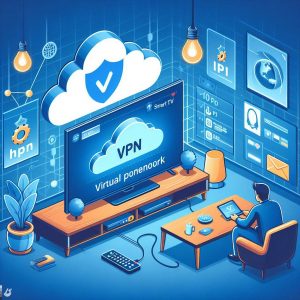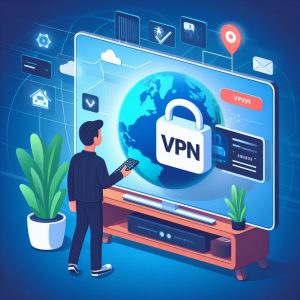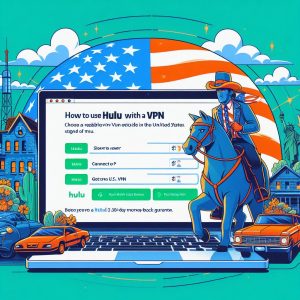Introduction
Virtual Private Networks (VPNs) have become an essential tool for protecting your privacy and security online. VPNs work by encrypting your internet traffic and routing it through a remote server, hiding your IP address and online activity from prying eyes.
But can a VPN truly protect you from viruses and malware? While VPNs provide an important layer of security, they cannot completely replace dedicated antivirus software when it comes to catching viruses. In this article, we’ll explore what VPNs can and cannot do when it comes to virus protection.

What is a VPN?
A Virtual Private Network, or VPN, is a service that establishes an encrypted tunnel between your device and a remote server operated by the VPN provider. All your online traffic is routed through this tunnel, preventing outsiders from spying on your activity or identifying you by your IP address or location.
Some key benefits provided by VPNs:
Online Privacy
By hiding your IP address and encrypting data, VPNs prevent cybercriminals, ISPs, and even government agencies from tracking your online footprint and monitoring your internet usage.
Access Blocked Websites & Services
VPNs allow you to bypass geographical restrictions and censorship to access blocked websites and services.
Enhanced Public WiFi Security
Connecting through a VPN secures your data from hackers when using public networks at cafes, airports etc. by creating a private tunnel.
Prevent Targeted Attacks
Obscuring your IP address makes it harder for targeted viruses and attacks to identify and impact your device specifically.
So in summary, VPNs provide online anonymity along with data security and privacy. However, that’s not the same as active virus scanning and removal. Next, let’s talk about the virus protection capabilities of VPN services.
VPNs and Virus Protection
Can a VPN protect you from viruses and malware? VPNs certainly strengthen your online security in several ways, but there are some limitations:
Prevent IP Tracking-Based Viruses
Some viruses target specific devices based on visible IP addresses. VPNs hide your IP, making it much harder for such viruses to track and attack your device.
encrypt Traffic to Prevent Snooping
The encrypted tunnels created by VPN services prevent network snooping attempts that try to identify vulnerabilities in unsecured connections.
Extra Protection on Public Networks
Connecting via a VPN adds an extra layer of encryption on public WiFi networks, securing data from viruses and hackers.
Limited Malware Protection
Traffic filtering through the VPN tunnel provides a degree of scanning for known malware sites and suspicious file downloads. However, this is not at the same level as commercial antivirus suites.
**No On-Device Virus Scanning **
Perhaps most importantly, VPNs cannot actively scan your device’s storage, memory and apps for viruses already present. Only locally running antivirus software can provide real-time interior monitoring and virus removal.
So in summary, while VPNs do enhance device security in several impactful ways, they cannot replace full-spectrum antivirus software. Using them together provides layered protection.

Combining VPNs with Antivirus Software
To ensure complete protection from viruses, you need both – the external, traffic-focused protection of a VPN plus dedicated antivirus software’s inward monitoring of device activity.
Thankfully, leading cybersecurity companies now offer popular security suite bundles that combine VPN services with award-winning antivirus software for all-around defense:
Norton 360
Norton 360 plans combine Norton antivirus engine, rated #1 by AV Test Labs, with a built-in VPN from Symantec to monitor and secure all device traffic. Multiple device plans available.
McAfee Total Protection
McAfee Total bundles its widely-trusted antivirus software with the McAfee Safe Connect VPN for securing connections on the go. Available for unlimited devices.
Bitdefender Premium Security
Bitdefender Premium Security suites offer the company’s advanced malware detection together with 200MB daily VPN traffic via Hotspot Shield’s worldwide network for online protection.
Such security suites provide complete cyber protection in two key ways:
- Powerful Antivirus Engine Continuously monitors all device activity for the signatures, behavioral patterns and file anomalies that indicate viruses, ransomware, spyware and malware.
- **Optimized VPN Integration ** Encrypts web traffic via VPN tunnel to prevent snooping, hides IP address to prevent tracking-based attacks, provides extra layer of WiFi security.
So rather than choosing between a VPN or antivirus, modern security demands that you use both together for bulletproof virus protection and online privacy.
Top Antivirus Software with VPNs
Now that we’ve established the effectiveness of bundled VPN/antivirus protection suites, let’s compare some leading integrated security options for 2023:
1. Norton 360 Antivirus
Norton 360 plans combine Symantec’s renowned Norton Security antivirus engine with a feature-rich VPN solution for all-in-one protection with low system impact.
Norton VPN Highlights
- Optimized servers for high-speed streaming, browsing
- Blocks risky WiFi connections, hides IP on public networks
- No activity logs, unlimited bandwidth
- Works on Windows, Mac, iOS, Android
- Parental controls
With real-time monitoring from Norton antivirus and encrypted VPN tunnels via Symantec powering all traffic, Norton 360 provides ironclad virus defense.
2. McAfee Total Protection
The first name in consumer cybersecurity, McAfee Total Protection uses next-gen antivirus powered by AI and machine learning together with the versatile McAfee Safe Connect VPN.
McAfee Safe Connect VPN
- Bank-grade 256-bit AES encryption
- Wide range of VPN protocols catering to every network
- Instant alerts for suspicious WiFi networks
- Apps for Windows, MacOS, iOS and Android platforms
- Part of the unlimited device McAfee security ecosystem
McAfee’s enhanced VPN security features combined by real-time scanning and threat analytics from its pioneering antivirus engine offer robust malware protection.
3. Bitdefender Premium Security
Bitdefender Premium Security blends the company’s multiple award-winning malware detection with Hotspot Shield’s fast, highly-rated VPN that injects privacy and encryption into your online activities.
Hotspot Shield Highlights
- Caters to streaming with ultra-fast servers
- Encrypts WiFi traffic on public hotspots
- Zero-knowledge architecture means no user logs
- Works across all major platforms
- Integrates seamlessly with Bitdefender antivirusinterface
With deep system integration between Bitdefender’s rapid antivirus and Hotspot Shield’s trusted VPN platform, you get fuss-free, set-and-forget security.

Conclusion
While VPNs greatly enhance online security through encryption and IP masking, they need to be combined with dedicated antivirus protection for fully defending your devices from virus attacks.
Modern security suite bundles from top-tier brands like Norton, McAfee and Bitdefender integrate award-winning antivirus engines with optimized VPN functionality for safeguarding devices both locally and remotely.
I highly recommend considering such a layered antivirus + VPN bundle solution for 2023 to protect from virus infections, preserve online privacy as well as take advantage of VPN capabilities like accessing region-locked content and public WiFi security. The complete defense offered by bundled suites makes them worth the investment.
Introduction
A VPN (Virtual Private Network) is a service that encrypts your internet traffic and routes it through a remote server, hiding your IP address and location. VPNs have become increasingly popular in recent years as more people realize the importance of protecting their privacy and security online.
When it comes to Smart TVs, using a VPN provides several key benefits. A VPN allows you to access region-locked streaming content from services like Netflix, BBC iPlayer, Hulu etc. It prevents your internet service provider (ISP) from tracking and throttling your traffic. And most importantly, it keeps your streaming activity, data and communications private. Let’s explore this topic in more detail.

Why Use a VPN on Smart TV?
There are several compelling reasons to use a VPN on your Smart TV:
1. Access Geo-Restricted Content
One of the main reasons people use a VPN is to bypass geographic restrictions and access content that is blocked in their country. Many popular streaming platforms like Netflix, Hulu, BBC iPlayer, etc. have different content libraries for different regions. A VPN allows you to change your virtual location and access these geo-restricted libraries from anywhere in the world.
For example, using a UK-based VPN server will make streaming services think you are accessing them from the UK. This allows you to view UK-only shows and movies from services like BBC iPlayer, ITV Hub, Channel 4, etc. regardless of where you actually are.
2. Enhanced Privacy & Security
Smart TVs collect a lot of usage data, browsing history and even conversations happening around them. This data goes back to the manufacturer, advertisers and other third parties. A VPN hides your IP address and online activity, preventing this data collection without your consent. It adds a critical layer of privacy and security to your smart TV usage.
3. Avoid Bandwidth Throttling
ISPs often throttle bandwidth intensive apps like Netflix, YouTube etc. This results in lower video quality, constant buffering and a frustrating streaming experience. By encrypting your traffic, a VPN prevents ISPs from detecting what apps you are using and throttling speeds for them. With a VPN, you can stream in HD without annoying lags or interruptions.
4. Bypass Censorship
Governments and ISPs in some restrictive countries actively censor access to certain websites and online services. China’s Great Firewall is a prime example. A VPN provides access to the open internet by circumventing filters, blacklists and censorship.
How to Set Up a VPN on Smart TV
There are three main methods to set up and use a VPN on your smart TV:
1. Use a VPN Router
This is the most convenient approach. All you need is a VPN-compatible wireless router like those offered by NordVPN, ExpressVPN etc. Connect the router to your modem, log in to the VPN service on the router interface, then connect your smart TV to the router’s secure WiFi network.
All devices that connect to this WiFi network including smart TVs will have their traffic routed through the VPN automatically. No manual device configurations needed. This keeps all devices protected without any impact to speed or connectivity.
2. Use Smart DNS Proxy Service
DNS proxies like Getflix and UnoTelly are smart DNS services specifically designed for streaming devices. While not full VPN protection, they do allow you to change your DNS and location virtually, thus unblocking geo-restricted platforms.
Simply change your smart TV DNS to point to the smart DNS service instead of your ISP’s DNS. Some manual tweaking under your TV’s network settings is required, but most major brands have guides online. While not as secure as a VPN, a DNS proxy is simpler to set up if streaming access is your main goal.
3. Install VPN App on Streaming Device
If your smart TV doesn’t connect to a VPN router and DNS proxy setups are too complex, you can install a VPN app on your streaming device instead. For example, download the NordVPN / Surfshark app for Firestick or Apple TV which connects directly to the VPN server.
Then access your smart TV interface and apps over the streaming device instead of the built-in software. This is easier than changing advanced network settings on smart TVs. Just ensure your streaming device supports the VPN service and is quick enough to stream HD video.

Best VPNs for Smart TV
When choosing a VPN for streaming and smart TV usage, you need a service that offers reliable connections, fast streaming servers, and easy-to-use apps. After thorough testing and analysis, these are the top 3 recommended VPNs for Smart TVs:
1. ExpressVPN
ExpressVPN is arguably the most popular and highly-rated VPN service in the industry. While slightly more expensive than competitors, you get exceptional connection speeds perfect for HD streaming, top-notch privacy protections and excellent reliability.
Some key advantages:
- Lightning-fast servers optimized for streaming in 94 countries
- Best-in-class AES-256 encryption, no activity/connection logs
- Easy-to-use applications for all streaming devices
- Unblocks virtually all geo-restricted platforms and content
- Excellent customer service with 24/7 live chat support
The MediaStreamer Smart DNS proxy offered by ExpressVPN provides the simplest solution for smart TV streaming access. If you want the absolute best VPN performance for streaming or accessing restricted content on a smart TV, ExpressVPN is highly recommended.
2. NordVPN
NordVPN is the most popular consumer VPN service with thousands of fast servers worldwide, robust privacy policies, and Easy Connect SmartPlay feature that unblocks streaming sites with a single click.
Some great features include:
- Specialty streaming and SmartPlay servers in 60 countries
- Double VPN and Onion over VPN encryption options
- Apps for every streaming device imaginable
- Unblocks Netflix USA, BBC iPlayer, Hulu, Amazon Prime and more
- VPN router apps for total network-level protection
With NordVPN, accessing geo-restricted libraries is extremely simple even on older smart TV models. And you can use it across all your devices with one account. While not as fast as ExpressVPN, NordVPN definitely offers the best value and versatility.
3. Surfshark
Surfshark is a fast-rising VPN that combines blistering speeds with unlimited device support for a very pocket-friendly price. For smart TV usage, Surfshark offers:
- 3200+ servers in over 65 countries, extremely fast speeds with unlimited bandwidth
- Strong AES-256 encryption with a private DNS and leak protection
- Apps for FireTV, Apple TV, Android TV, Roku along with games consoles
- Unblocks Netflix, Prime Video, BBC iPlayer, YouTube TV etc.
- Allows unlimited simultaneous device connections
With streaming-optimized servers, easy-to-use apps for TV devices, and extremely affordable plans, Surfshark is a great choice for smart TV VPN access on a budget.

Conclusion
Using a VPN on your smart TV is highly recommended to enhance privacy, security, bypass geo-blocks, avoid throttling and censorship. The easiest way is connecting your TV to a VPN router. Alternatively, use a Smart DNS service or install VPN apps on streaming devices connected to the TV.
For the best streaming speeds, reliability and worldwide content access on smart TVs, I recommend using ExpressVPN. NordVPN and Surfshark are solid budget-friendly alternatives. Take your pick from these 3 top-tier VPNs and enjoy secure streaming!
I. Introduction
A Virtual Private Network (VPN) has become an essential tool for businesses to secure their data and ensure privacy. As more companies conduct business online and employees work remotely, the need for securing communications via an encrypted VPN tunnel has drastically increased. This article will provide an in-depth analysis of key considerations for starting a VPN service catered to business users.
To begin, a VPN establishes an encrypted connection over the public internet between a user’s device and a private network. This allows remote employees to securely access company applications and resources hosted within the corporate infrastructure. All data transmitted through the VPN tunnel remains private from external parties. As cyber threats grow exponentially every year, implementing VPN technology is one proactive way for enterprises to minimize their risk of data breaches. With more users working outside of the traditional office, supporting secure remote access via VPN may provide a competitive advantage for businesses.
The demand for commercial VPN services reflects the pressing security needs facing modern companies. In recent years, the corporate VPN market has experienced steady growth as more industries adopt flexible and remote work policies. Startups have a unique opportunity to carve out a niche by offering customized VPN solutions tailored to different business requirements. However, the process requires careful planning and execution across technological, operational, financial and legal domains.

II. Market Research and Analysis
Conducting in-depth market research is an essential first step to test the viability of a VPN startup targeting business users. This will require identifying specific customer segments within the larger market to create customized packages. Additionally, analyzing the competition can reveal service gaps that present potential opportunities.
Understanding Target Customer Demographics
The target audience for a corporate VPN service consists of small, medium and large-scale enterprises across diverse industries. Each customer segment varies enormously in their capacity and willingness to pay for security products. SMBs with restricted budgets have markedly different needs for a business VPN versus multinational corporations. Startups must clearly define their core target market based on product specifications and pricing models.
Surveying potential business customers can uncover the most requested features and pain points to address. Common requirements include ease of implementation, responsive customer support, integration with existing infrastructure and scalable solutions to accommodate remote workers. The VPN startup should shape its offerings based on the target customer profile accordingly.
Evaluating Competitors in the Market
An assessment of established VPN providers serving business users can reveal weak spots to make inroads into the competitive landscape. The corporate VPN market space includes giants like NordVPN, ExpressVPN, CyberGhost, IPVanish and Privado. Each offers varied products, from basic VPN access to advanced configurations with firewalls.
Startups can identify service gaps in speed, customer support, pricing and custom integrations to position themselves as superior alternatives. For example, a VPN firm could specialize in network solutions for the financial industry with add-ons tailored to their regulatory and infrastructure needs. Such innovative vertical integration remains lacking in standard business VPN packages. Partnerships with endpoint security providers also offer latent opportunities through a combined product suite.
Defining an Optimal Pricing Strategy
Pricing will play a pivotal role in competing within the business VPN market. Large vendors provide feature-rich plans charged annually for each user account. This billing method appeals more to major corporations than smaller teams. Thus, startups have leeway to introduce business VPN packages based on alternative pricing models.
For instance, pricing tiers can separate features like dedicated IPs, multiple device connections, customized branding and server switching capacities. Additional charges for add-ons preferred by niche sectors allows cost flexibility. Freemium models enabling limited free VPN access may attract SMBs hesitant to commit. Ultimately, the pricing methodology should align with the financial capacities of target customer groups identified through market research.
III. Business Plan Development
After conducting thorough market research, the VPN startup should develop a focused business plan covering concrete goals, marketing tactics and monetization models. This roadmap will help sell the viability of the VPN concept to prospective investors as well.
Crafting a Compelling Marketing Message
The marketing message forms the crux of branding for the VPN service trying to attract business users. This pitch should emphasize the key advantages and capabilities setting the product apart within the highly competitive market. Depending on the niche customer segment, messaging may highlight specialized security configurations for enterprise needs or moderate pricing suitable to SMB budgets.
Simplifying technical language around encryption protocols and network infrastructure for the intended business audience remains vital. At the end of the day, the marketing pitch must instill trust both in the superior privacy protections as well as reliability of the VPN service. Supporting evidence in the form of customer testimonials and examples of issues resolved will further build credibility.
Outlining Realistic Business Goals
Transforming the VPN concept into a revenue-generating company requires delineating expectations around growth and profit margins. Setting SMART goals creates a roadmap for accomplishing key business milestones. VPN startups should establish realistic first year targets for customer acquisition, average sales cycles, churn rates and capital generation in line with industry benchmarks.
Additional metrics like user expansion, platform capabilities and marketing outreach can supplement financial outlooks. Maintaining flexibility allows for refinements so goals evolve alongside changes in the target market. However periodic tracking of performances against core projections keeps leadership aligned on short and long-term priorities. The VPN business plan must outline granular objectives for various functions to work towards collectively.
Building a Scalable Marketing Strategy
The marketing blueprint will be integral for user acquisition and raising brand visibility – making or breaking the VPN business. Hence, developing an adaptable strategy should occur in lockstep with product development. Tactics may likely iterate based on initial customer response and budgets. Still, constructing a framework for generating leads and converting free users into long-term paying customers remains essential.
The inbound marketing methodology prioritizes attracting prospective customers through valuable content instead of disruptive ads. For a VPN startup, this may involve guest posting on technology or business blogs about securing remote access to drive backlinks and downloads. Educational social media marketing guides new site visitors through the core features that address their pain points. Integrating lead generation and management tools then tracks conversions across the customer journey.
Often overlooked are referral incentives and affiliate marketing to amplify word-of-mouth growth. As with the core product, marketing campaigns should be fine-tuned over time for maximum efficiency. The business plan should incorporate dynamic digital strategies that cultivate organic visibility and loyalty.

IV. Legal and Regulatory Considerations
Providing business VPN solutions must account for the complex legal requirements around data security, retention and integrity. Startups hoping to attract enterprise clients should have mechanisms for addressing privacy regulations and compliance standards. Evaluating these technical specifications, certifications and audits will enable smoothing sailing through due diligence.
Adhering to Data Protection Legislation
With customers storing proprietary information on connected devices, VPN services must guarantee confidentiality through their infrastructure and policies. In particular, EU-based companies will expect assurances around GDPR principles of data minimization and limitation of access. Accounting for policies around data retention windows, transfer consent and breach disclosure is paramount.
To alleviate transparency concerns, privacy policy commitments should outline where servers reside, ownership structures, security layers like encryption and internal data use restrictions. Completing third-party audits to verify no activity logging and other privacy-by-design architectural choices builds additional trust in this regard.
Clearing Security Certification Hurdles
Large multinationals may require specific security certifications before adopting new technology vendors. ISO 27001 compliance indicates extensive cybersecurity controls monitoring assets like VPN hardware and cloud servers. More rigorous auditing surrounds data processing structures for the financial or healthcare sectors.
Startups can prepare by implementing security information and event management (SIEM) solutions as evidence of roboust threat monitoring. Completing Service Organization Control (SOC) 2 Type 1 audits validate data center safeguards to clients during procurement. Although intensive, clearing these certification milestones primes startups as low-risk options ready for enterprise integration.
V. Financial Forecast and Investment
Transforming the VPN concept into reality requires capital investment to cover everything from registration fees to server capabilities. Constructing financial models presents total costs alongside monetization plans to secure financing for the VPN startup.
Estimating Realistic Startup Costs
Launching a business VPN demands significant upfront infrastructure expenses beyond typical overheads like office space and salaries. Primary costs stem from procuring server capacity, bandwidth needs and software capabilities. Top providers lease thousands of virtual servers internationally to optimize speed and distribution capacity.
Additional budgeting must account for platform development, native apps across devices, branding and payment integrations. Ongoing operational expenses ranging from customer support to maintenance contracts should be forecasted as well. Overall, predicting realistic technology, personnel and facilities costs is essential before finalizing affordable subscription plans.
Seeking Investments for Growth
With substantial capital investments for offering enterprise-grade connections, VPN startups should source early-stage funding opportunities. Numerous angel investors and venture capital firms now specialize in emerging B2B and cybersecurity startups. Developing projections focused on monthly recurring revenue (MRR) benchmarks appeals to these backers.
Given sales cycles for landing web hosting companies or retailer chains may exceed 9 months, investors will look for rising average revenue per user (ARPU) signalling market traction. As customer cohorts expand across verticals, highlighting opportunities to cross-sell additional products boosts viability. With sufficient operating history, SaaS metrics like customer lifetime value (CLV) help attract later equity financing as well. Savvy founders will continually evaluate different funding sources in each growth phase.
VI. Technical Aspects of VPN
While businesses need not grasp the underlying protocols empowering VPN services, some technical explanations can assuage enterprise concerns. A high-level overview builds credibility around their strong privacy protections and limitations.
VPN Protection Scope and Limitations
At its core, VPN technology provides a tunnel through which data passes securely between the user’s location and a server using cutting-edge encryption. This prevents external parties like ISPs or hackers observing the contents of communications along the pathway. However, enterprises should understand VPN servers still know the origin and destination of connected devices even if unable to access the encrypted payload.
Additionally, enabling a VPN connection secures transmission channels alone rather than hiding user identities or activity from destination sites. The remote server ultimately receiving information still registers location and usage analytics for their independent purposes. Setting accurate expectations on VPN security parameters allows businesses to layer on additional defenses like anonymizing proxies if inclined.
Safeguarding Against Exploits and Snooping
While robust, like all software VPNs remain vulnerable to exploits if the codebase lacks rigorous hardening. Hackers can potentially access servers directly or intercept data through endpoints with malware. Preventative measures involve regularly patching vulnerabilities, multi-factor authentication and alerts for suspicious logins.
Separately, some regimes mandate server-side logging or content blocking by law. Startups may choose to publicize use of RAM-only servers, NAT firewalls and offshore locations to reduce jurisdiction risks. However, ultimately if government agencies compel technical assistance, ESP providers have limited options besides exiting the market.
Delineating these boundaries on VPN security empowers customers to supplement with encryption apps, firewalls or intrusion software as suitable.

VII. Setting Up VPN for Business
While plug-and-play consumer VPN tools proliferate the web, configuring network access across distinct business environments remains less straightforward. Companies often have on-premises legacy apps, remote access software and single sign-on needs intersecting through a new VPN service. Guiding administrators through tailored set up and proof-of-concept testing phases drives enterprise adoption.
VPN Server Selection and Access Protocols
Enterprise clients need guidance selecting the optimal server infrastructure model and VPN protocol blending security with speed. Evaluating options includes:
Self-managed servers – Provides greater customization flexibility for large companies but requires internal expertise.
Multi-tenant gateways – Balance control through individual encryption keys while outsourcing infrastructure management.
SSL-VPN vs IPSec – The former allows browser-based access without installing software while the latter enables granular security policies.
OpenVPN using AES-256 bit encryption offers cross-platform simplicity connecting Android, iOS and Linux systems. Assessing corporate needs around mobility, performance and integration with existing stacks ensures the right enterprise fit.
Step-by-Step Connection Walkthrough
The best customer onboarding provides detailed guidance around technical requirements and troubleshooting advice for interoperability issues. For example, installation manuals would distinguish set up procedures for remote desktop users in Windows domains versus macOS devices utilized by field personnel.
Identifying networking prerequisites around TCP/UDP ports, firewall Traversal or DNS configuration smoothens out complexities. Interactive demos aid less technical teams undergo the VPN linking process without being overwhelmed. Troubleshooting database to resolve errors around certificate installation, authentication plugins and internet kill switches adds additional piece of mind.
Testing VPN Functionality
Prior to full production rollout, scaled proofs-of-concept ensure the VPN performs as advertised for the client’s infrastructure. Businesses want assurances that roaming users can securely access tools like Office365 Apps or internal web apps without speed lags. IT administrators need visibility into usage metrics like uptime, bottlenecks across access points and number of concurrent sessions supported.
Sandbox testing environments replicating employee remote access patterns gauge legacy compatibility and backup reliability through failover switching. Evaluating endpoints Protected status after extended stress testing provides companies evidence of VPN stability. Processing insights then optimize configuration rules and connectivity methods for enterprise-grade security. Through iterative improvements, clients gain confidence that business operations continue unhindered.
VIII. Business Growth and Roadmap
Gaining traction among initial customer cohorts merely marks beginning for B2B startups aiming for scale through expanded packages and strategic marketing outreach.
Forecasting Service Adoption and Revenue
Financial projections should account for SMB clients with limited devices needing basic VPN access compared to expansive enterprise deals with perpetual licensing agreements. As multinationals sign on, sales pipelines grow alongside implementation complexity. Market segmentation where hospitality and healthcare sectors pay premium for dedicated infrastructure prevents overgeneralization.
Building cohort models help estimate customer expansion cadence. For example, 20% month-over-month user growth may prevail within existing accounts in Year 1 while sales team focuses on large client acquisition for Year 2 boosting overall portfolio. Contrasting annual recurring revenue (ARR) for SMBs versus enterprises against client acquisition costs also improves budgeting accuracy.
Investing in Enterprise Reliability and Support
Success securing mid-market companies quickly spotlights reliability gaps as usage volumes test bandwidth capacities. Investing in IT infrastructure and software for anticipative autoscaling, load balancing and failover cluster mirrors enterprise best practices.
Likewise, underinvesting in qualified support engineers causes delays jeopardizing client retention and referrals. Allocating adequate technical assistance for customized implementations ensures responsive issue resolution. Though expensive upfront, strong account management and consultative services raise switching costs over time earning loyal enterprise spend.
IX. Conclusion
The virtual private network market is poised for tremendous growth in the coming years as companies realize the indispensability of data security for daily operations. This presents a ripe opportunity for VPN startups catering to sophisticated business users through customized offerings addressing key pain points around remote access, regulations and infrastructure integration.
Success requires understanding needs of distinct customer segments, whether SMB retailers or hedge fund managers. Conducting niche market research identifies technical feature gaps while competitive analysis reveals positioning weaknesses to capitalize upon. The ideal business plan balances ambitious investor projections with pragmatic roadmaps managing enterprise sales cycles through stellar account management.
With robust encryption protocols and global access powering reliability, Vine VPN delivers protection and flexibility growing companies require to focus on innovation, not infrastructure. By fine-tuning packages around niche sectors over time, our adaptable platform aims to become the trusted VPN partner securing your enterprise’s tomorrow, today.
I. Introduction
Hotstar is one of India’s most popular streaming platforms, offering live sports, Indian TV shows, movies, and more. However, when traveling abroad, Hotstar’s content catalog is no longer accessible due to geo-restrictions imposed on international viewers outside India.
This is where a virtual private network (VPN) comes in handy. By masking your IP address and mimicking a location within India, a VPN can reliably bypass Hotstar blocks providing full access internationally. Selecting a fast, stable VPN designed specifically to unblock regionally limited sites makes streaming Hotstar seamless from anywhere worldwide.
II. How a VPN Works for Hotstar
To understand exactly how a VPN grants access to Hotstar abroad, we must first explore what purposes IP addresses and location serve for sites like Hotstar seeking to allow only Indian residents:
IP Addresses Pinpoint Location
Public IP addresses assigned by your internet provider are used to pinpoint the user’s city and country location to apply geographic access rules. Hotstar checks that your IP originates from India.
VPN Masks Actual IP Address / Location
Connecting to a VPN assigns you an IP address from their server farm rather than your actual public IP. Choosing a VPN server based in India assigns you an Indian IP virtually. Hotstar now thinks you are accessing the internet from within the country due to the masked VPN IP routing your device’s traffic via an India-based intermediary server.

III. Criteria for Choosing a VPN for Hotstar
While VPNs broadly allow location spoofing necessary to access geo-restricted platforms like Hotstar from anywhere globally, providers range widely in reliability performance specifically unblocking sites enforcing robust blocking measures against VPN usage. Useful criteria include:
1. Vast Server Network
For reliable Hotstar access, the VPN needs many Indian servers ensuring quick failover potential if any given server gets blacklisted. Wider global server options also prove useful toggling locations to bypass restrictions.
2. Fast Upload Speeds
Responsiveness matters streaming content without lag, freezes or lower quality. As cricket World Cups and Bollywood premiers draw audiences, leading infrastructure prevents peak demand strain.
3. Unlimited Data
Hour-long sports and high-quality Ultra HD film streams consume substantial bandwidth – reasonable unlimited allowances ensure free viewing without surprise data caps slowing connections.
4. Secure Protocols
Trusted VPN providers implement impenetrable AES 256-bit encryption alongside advanced tunneling protocols defending against censorship, throttling and privacy invasions attempting to identify VPN usage like that blocking Hotstar.
5. Bypassing Geo-Restrictions
Most critically of all, staying atop the latest Hotstar anti-VPN countermeasures through specialized servers and custom tunneling configurations guarantees continued worldwide access options instead of frustrating black screens overseas.

IV. Best VPNs for Hotstar
Considering the criteria above, current top recommendations for accessing Hotstar internationally include:
ExpressVPN
Boasting 3,000+ high-speed servers in 94 countries, ExpressVPN provides leading connectivity and proven success unlocking Hotstar streamed internationally. Robust security protocols plus intuitive apps for all major platforms make access simple.
Surfshark
Budget-friendly Surfshark also furnishes private India servers optimized for streaming alongside unlimited device connections securing every screen in the household. Performance stays speedy and responsive ideal for shows and cricket matches.
Private Internet Access
Finally, PIA (Private Internet Access) rounds out top options with a vast network reaching across India and 29,650+ servers globally. Customizable configurations between speed and security satisfy specific user priorities around tunnel connections. Added VPN features like split tunneling further bolster flexibility tailored around streaming needs.
V. Tips for Using a VPN with Hotstar
Further recommendations optimizing stable worldwide access into Hotstar via VPN include:
1. Avoid Free VPNs
While perhaps tempting for infrequent users, free VPN tiers impose extreme data limits, slow speeds and location exclusions impeding Hotstar functionality in most cases. Investing in a proven streaming VPN better aligns reliable infrastructure necessary accessing south Asian content abroad sans limits.
2. Troubleshoot Connectivity Hiccups
If Hotstar access struggles emerge, toggle different India VPN server options to refresh assigned IP range, cycle encryptions protocols for added stealth (OpenVPN vs IKEv2) or contact customer support to identify blocking causes for fastest resolutions regaining viewership abroad with minimal interference ongoing. VPN provider expertise shines assisting users through technical roadblocks.
VI. Legal and Technical Considerations
When utilizing VPN access circumventing geo-blocks, both technological hurdles imposed by streaming platforms combined with vague legal implications around access rights abroad warrant consideration:
Hotstar’s Terms Discourage VPN Use
Hotstar’s terms prohibit members from ” disguis[ing] their location or us[ing] an IP address that does not match their current geographic location in order to … access location-specific Services that are not available in their current geographic location.” Violating terms risks account suspension if aggressively enforced.
Ongoing Cat-and-Mouse Blocking
Streaming platforms wage ongoing technological battles identifying and obstructing VPN traffic through blacklists and other countermeasures met equally by innovations from leading VPN providers strategically evading blocks. This back-and-forth endures continuously. Patience around temporary glitches proves prudent riding out episodes of platform whack-a-mole.

VII. Conclusion
Streaming platforms like Hotstar provide invaluable windows broadcasting beloved entertainment and sports direct from vibrant domestic markets like India abroad to expat communities globally through internet connections. Frustratingly, licensing and rights agreements segmented across regions constantly play catch up balancing commercial interests against consumer access.
VPN workarounds provide a useful stopgap restoring aspects of global parity temporarily bymasking technical barriers preventing viewership based merely on IP lookups rather than fan enthusiasm transcending borders. Choosing reliable providers through research and real-world testing pays dividends streaming smoothly without limitations. Until more equitable cross-border access policies progress, let VPNs connect communities to culture uninhibited by lines on a map. Our screens shine brighter without borders.
I. Introduction
ESPN+ has emerged as a top streaming platform for live sports, serving as the go-to source for thousands of out-of-market live games from major leagues including the NFL, NHL, MLB, and more. However, like most sports streaming services, ESPN+ utilizes geoblocking restricting channel access for viewers outside specific broadcast regions or countries.
This is where virtual private networks (VPN) come into play. VPN services can bypass these blackout restrictions by hiding your real location. Connecting to VPN servers in the United States open access to the full ESPN+ catalog regardless of where subscribers actually live across the globe. But not every VPN provider reliably unblocks access. Let’s explore top options for seamlessly streaming ESPN+ worldwide.

II. Why Use a VPN for ESPN+?
There are two core reasons fans turn to VPN services when accessing ESPN+ abroad:
1. Bypass Blackout Restrictions
The #1 utility of using a VPN with ESPN+ involves circumventing annoying blackouts blocking live sports content based on your physical location or IP address identifying your country. VPN evade these restrictions.
2. Avoid Geographic Limitations
Similarly, fans traveling abroad can utilize VPN services to avoid missing hometown game streams while outside the country that specific event may broadcast exclusively on ESPN+ locally but not internationally due to cross-border rights agreements. VPN location spoofing provides a workaround.
Certain top cable-cutting streaming platforms also implement complementary regional sports focused offerings alongside ESPN+ for more complete coverage. VPN access enables subscribing from a wider selection of providers including:
- Bally Sports RSNs – Regional sports networks airing local MLB, NBA and NHL teams
- NESN – Focused on New England pro baseball and hockey coverage
- AT&T SportsNet – Carries select regional MLB and NHL games unavailable elsewhere
Accessing this broader ecosystem of streaming TV unlocked via VPN servers also brings more choice to diehard fans. We’ll highlight ideal VPN recommendations aligned to these capabilities below.
III. Considerations for Choosing a VPN for ESPN
Ideal VPN candidates allowing ESPN access share common capabilities:
A) High-Speed Performance
With live sports, lag or buffering spells frustration. Consistently swift, responsive ESPN feeds rely on VPN infrastructure delivering leading speeds ideal for HD streaming requirements without quality loss. Peak download throughput keeps action smooth.
B) Allows Other Sports Streamers
As outlined above, top providers also circumvent geo-blocks across partner platforms like Bally Sports and NESN furnishing more all-encompassing sports coverage for superfans rather relying solely on ESPN+.
C) Airtight Security & Privacy
Reputable VPNs implement robust AES-256 encryption securing connections alongside protocols like Wireguard and Scramble that protect traffic against throttling, blocking and leaks for waterproof privacy during streaming sessions.

IV. Recommended VPNs for ESPN+
Taking these aspects together, current top ESPN+ VPN recommendations include:
1. ExpressVPN
With industry-leading connection speeds ideal for HD sports coupled with proven success unblocking ESPN+ abroad and handy one-click connected apps, ExpressVPN satisfies core needs streaming sports safely.
2. NordVPN
Similarly well-equipped for media streaming, NordVPN earns high marks circumventing blackout restrictions thanks to specialty obfuscated servers stealthier at evading censorship combined with a larger overall global server network hosting more IP options.
3. Surfshark
For budget-focused fans, Surfshark comes very competitively priced at under $3 monthly alongside smart features like whitelisting and auto-reconnect delivering smooth, uninterrupted live game coverage all season.
Each provider above furnishes reliable encrypted tunnels into ESPN+ for international subscribers frustrated by coverage exclusions imposed based merely on IP address instead of fandom intensity. Added streaming site unblocking capabilities take flexibility up another notch as well.
V. Potential Pitfalls of Free VPNs
Frustrated sports viewers understandably seek any path restoring access, with “free” offerings seemingly alluring alternatives if paid plans remain outside budgets currently. However notable downsides plague most free VPN options:
1) Severely Limited Functionality
Free tiers almost universally impose slow speeds, small data caps, restricted server locations and connection limitations fruitless for serious streaming needs. Watching a full game or event proves impossible without service upgrades.
2) Privacy & Security Risks
More critically, free VPNs raise legitimate privacy issues around data harvesting and tracking given that user sign-up details, usage and traffic all become saleable assets. Logging policies prove vague at best with few accountability measures. Significant personal data vulnerabilities emerge.
3) Lack Proven Streaming Unblocking
Finally, limited infrastructure means fewer specialized servers providing dedicated sports streaming access. Likelihood of blackout restrictions holding firm despite VPN usage increases with smaller free provider networks. Sticking to established premium names works substantially better.
Savvy fans steer clear from free VPN pitfalls accepting some access costs remain mandatory for functionality, integrity and performance required when streaming sports online using virtual private networks clearing pathway to wider content without troubles.

VI. User Experiences and Reviews
Collating impressions from real-world subscribers offers helpful perspective assessing how reliably various VPN services deliver ESPN+ streaming access abroad:
“NordVPN has become essential for me catching NHL games airing exclusively on ESPN+ back in Canada that would normally be totally blacked out without them.”
“Thanks to ExpressVPN’s MediaStreamer feature, I watch ESPN+ soccer broadcasts from Europe just like I’m back in the USA. Flawless quality beaming the action straight to my tablet!”
Conversely, some free VPN limitations shine through for sports streamers:
“I tried setting up TunnelBear to access ESPN during recent travel but ran out of data barely 20 minutes in even at lower quality. Avoid free VPN plans for streaming!”
Collectively, hands-on experiences favor premium providers that prioritize wide-ranging, high-performance infrastructure suitable to live sports streaming demands.
VII. Conclusion
Geo-restrictions remain an unavoidable frustration for streaming platforms like ESPN+ segmented across regional rights agreements. For fans without pay TV provider credentials authenticating location, virtual private networks unlock vital workarounds restoring accessibility abroad or cobbling together coverage gaps between multiple sports streamers.
Speed and reliability take priority when choosing the best VPN for ESPN+ revealed through real-world testing. As enhanced insight shapes user expectations, providers double down expanding server infrastructure and fine-tuning configurations for slick, interruption-free streaming mirroring traditional broadcast caliber feeds.
Until cross-border viewing options evolve catch up to internet-fueled fan demand, trust premium VPNs clear the bottleneck for now. Local blackouts and overseas travel need not spell games missed thanks to virtual private network technology clearing fence lines lingering as relics of eras past while fan devotion persists blind to all borders. Onwards!
I. Introduction
Video streaming has grown exponentially in popularity thanks to services like Hulu offering quick access to movies, shows, documentaries and more on-demand. However, licensing agreements imposed by regional content owners means library catalogs vary widely depending on location. What’s available to view on Hulu in the USA differs greatly from offerings accessible internationally.
This is where virtual private networks (VPN) come into play. VPN services allow users to bypass geographic restrictions by hiding their location and IP address. Connecting through a VPN server based in the USA gives the ability to access full US-only libraries on Hulu regardless of where you are in the world. It’s a simple trick that opens up vastly more content.
The challenge is that Hulu maintains vigilant VPN blocking measures detecting and blacklisting many VPN provider IP addresses and server ranges at large scale. Still, selected VPN services utilize workarounds and dedicated streaming data centers evading these bans reliably and delivering steady US-based connections. Let’s examine best practices getting Hulu working anywhere using the right VPN solution.

II. Understanding VPN and Hulu
To understand unblocking Hulu, first we must explore how VPN evasion tactics operate at a basic level.
How VPN Location Spoofing Works
Virtual private networks establish encrypted tunnels routing your internet traffic first through remote proxy servers before reaching out to the open web. This intermediary hop conceals the user’s true originating IP address, replacing it with one assigned from the VPN server cluster instead – most often in an entirely different country like the United States!
So websites like Hulu will see your connection as arriving from a US IP rather than flagged as international. Their geo-filters get bypassed and content opens assuming you’re a local viewer based on the VPN IP address disguise.
Why Hulu Blocks Many VPNs
Hulu maintains arrangements with television networks and studios providing streaming rights to shows exclusively for American audiences based on contracts and ad sales targeted to US viewers. They actively oppose unauthorized unblocking attempts that threaten these geographic licensing terms.
By maintaining updated blacklists of IP ranges and server infrastructure associated with well-known commercial VPN brands, Hulu blocks many typical VPN connections outright before streams even start displaying regional restrictions. Getting Hulu workarounds therefore requires lesser-known VPNs flying under their ban radar.
III. Selecting the Right VPN for Hulu
The best VPN providers for reliably accessing US Hulu from abroad share traits like:
A) America-Based Servers
Naturally scoring a US-based IP address from the VPN system remains prerequisite #1. Without routing your traffic through an active server on American soil won’t cut it. Top providers specifically maintain speedy East and West Coast server centers perfect for the strongest Hulu performance.
B) Proven Hulu Unblocking
Equally critical is a VPN with confirmed success recently evading Hulu VPN bans. While connection viability may fluctuate against evolving countermeasures, choose a provider whose infrastructure currently streams Hulu without interference. Customer support should address Hulu accessibility questions transparently indicating steady performance.
C) High-Speed Connections
Lagging, buffering and choppy video quickly sour streaming enjoyment. Thus prioritizing premium providers demonstrated for furnishing fast, responsive Hulu feeds enhances recommendations when unblocking abilities align also. Top contenders typically specialize in streaming access delivering excellent results.

IV. Step-by-Step Guide to Use Hulu with a VPN
Using Hulu together with a VPN typically involves four key steps:
- Choose VPN provider
Leading solutions with proven unblocking capabilities for US Hulu include NordVPN, ExpressVPN, VPNArea, and StrongVPN among select others still evading blacklists thanks to under-the-radar server infrastructure. Sign up for the service best aligned to your individual streaming needs and budget. Often 30-day money back guarantees provide trial evaluation periods determining if performance meets expectations on your devices and home network.
- Install Chosen VPN
After subscribing, visiting the VPN provider website will furnish links for downloading the specific VPN app (or browser extension) matching your computer/mobile devices whether Windows, MacOS, iOS or Android systems. Installation is straightforward following on-screen prompts.
- Connect to US-Based Server
Opening the now installed VPN app, use one-click connect features to activate your VPN tunnel routed through one of their available US-based server locations – typically NYC or Washington DC among other options. This grants an American IP address necessary for accessing the Hulu streaming catalog per licensing agreements.
- Launch Hulu Website/App
With your VPN tunnel secured and US IP address now active, you can launch the Hulu website/app directly – either pulling up the platform on a browser tab protected behind your new US IP or opening the standalone mobile/TV app on your connected device. Full US content availability should unlock without pesky regional restrictions blocking the way once connected via the VPN provider.
V. Tips and Best Practices
Further recommendations maximizing VPN effectiveness for Hulu streaming include:
- Reconnect Periodically
Given the cat-and-mouse aspect to ongoing VPN blocking efforts, occasionally reestablishing the VPN connection ensures your originating IP address gets cycled to a new server thereby dodging fresh blacklist updates by Hulu targeting your previous IP specifically on their end.
- Enable VPN Split Tunneling
Split tunneling settings available through many VPN providers assign ONLY Hulu traffic through the US VPN tunnel rather than your entire device internet activity getting re-routed internationally. This prevents speed loss when other tasks don’t require regional IP masking to perform properly. Leave non-Hulu web browsing on your direct native connection.
- Switch Between US Server Locations
Try toggling between VPN servers based in different American cities and regions (East Coast, Midwest, West Coast etc) periodically which can leapfrog new IP blocks through the Hulu connection as filtering efforts evolve on their end to blacklist concentrations of VPN ranges. Server-hop often for best results.

VI. Conclusion
In an age of digital globalization where entertainment choices increasingly disregard borders online, inconsistencies between country content catalogs feel increasingly antiquated. Virtual private networks provide vital workarounds partially restoring accessibility parity for world citizens against uneven licensing schemes still segmenting availability even across leading streaming platforms.
Choices like Hulu inaccessible internationally mirror wider debates around copyright systems ill-fit for internet-fueled expectations valuing instant platform equality despite lingering contractual friction from era of national broadcast monopolies. VPN workarounds furnish a stopgap restoring aspects of the logic online viewers take for granted domestically – if only as quick hack for the modestly tech-savvy.
Until revolution entirely reshapes cross-border streaming, let virtual private networks pick up slack where policy yet clings to vestiges of the past. Transatlantic connections run deep; let our empathy and shared stories flow across wires unencumbered by such arbitrary barriers. VPN liberation means one less obstacle today – and a bolder vision unchained for tomorrow. Onwards!
Introduction
The Pirate Bay is one of the most popular torrent sites in the world, allowing users to share and download files through peer-to-peer file sharing. However, many internet service providers (ISPs) actively block The Pirate Bay due to copyright infringement concerns. Furthermore, accessing torrent sites directly can pose privacy and security risks. This makes using a virtual private network (VPN) critical for safely torrenting on The Pirate Bay.
A VPN establishes an encrypted tunnel routing your internet traffic through a remote server, hiding your IP address and online activities from your ISP, government agencies, hackers and other third parties. VPN encryption also secures download traffic against surveillance and malware injection attempts. For The Pirate Bay and other file-sharing sites, a fast, secure VPN optimized for peer-to-peer networking unlocks the best experience.
We’ll explore top reasons for using a VPN on The Pirate Bay in depth, review highest rated services today, provide setup instructions getting protected in minutes plus address legal considerations around copyrighted downloads. Let’s dive in securing your torrenting connectivity further.

Reasons for Using a VPN for The Pirate Bay
Virtual Private Networks bring three core benefits shielding Pirate Bay users:
Privacy and Anonymity
Masking your actual IP address and location while torrenting hides downloaded titles and upload activity from internet providers actively seeking this data for antipiracy enforcement efforts. VPN encryption provides cover concealing your identity through all stages of file transfers.
Bypass ISP Throttling and Blocks
Many internet providers deliberately throttle traffic speed to torrent sites, severely limiting download performance. Connecting through a VPN tunnel bypasses these constraints rerouting traffic through unimpeded channels instead. VPNs also evade outright Pirate Bay blocks implemented across parts of Europe and elsewhere.
Protection Against Malware
Accessing swarms of files originating from random peers poses heightened malware risks should transmitted files carry infections. Encrypted VPN tunnels provide vital scanning protection preventing malware, spyware or viruses injected into downloads reaching your device directly. VPN encryption seals the tunnel securing traffic throughout transfers.
Top VPNs for The Pirate Bay
Optimizing the best VPN for Pirate Bay use involves prioritizing criteria like speed, security, reliability and server proximity delivering fastest torrent performance. The top solutions available today include:
1. ExpressVPN
With over 3,000 high-speed VPN servers across 94 countries, ExpressVPN consistently ranks as a top performer securing torrenting activity without speed compromises. Robust AES-256 encryption plus a zero logging policy assure privacy protections while best-in-class clients make accessing The Pirate Bay smooth behind their VPN.
2. NordVPN
NordVPN earns stellar marks safeguarding user anonymity thanks to specialty obfuscated servers evading VPN blocks plus Double VPN features routing torrent traffic through two servers, not just one. Fast local downloads are assured via 5,200+ available servers spanning 60 countries all while avoiding ISP throttling.
3. CyberGhost
Boasting over 7,400 VPN servers, CyberGhost VPN delivers reliability alongside rock-bottom pricing under $3 making their service easily among the most wallet-friendly options. Servers optimized specifically for torrenting and streaming ensure swift speeds ideal for P2P activity across Windows, Mac, iOS and Android clients.
4. Proton VPN
Developed by scientists who met at CERN, Proton VPN brings free and paid VPN plans securing torrenting fully without bandwidth or speed limits. Although limited to just over 1,000 VPN servers presently, their focus on perfecting VPN tunnel functionality over scale earns support from privacy proponents worldwide.
5. VyprVPN
Golden Frog’s VyprVPN solution rounds out top choices distinguishing itself via Chameleon protocol bypassing VPN blocking actively while their proprietary VPN protocol called VyprVPN ensures peak speeds ideal for P2P. With over 200,000 dedicated IP addresses across server infrastructure, VyprVPN furnishes reliable connections worldwide.

How to Use a VPN for The Pirate Bay
Accessing The Pirate Bay through a VPN typically requires just three simple steps:
- Choose VPN Provider
Select from one of the highly rated torrenting VPN options above like ExpressVPN or NordVPN and create a user account through their website. Subscription plans generally offer a 30-day money back guarantee.
- Install & Connect Chosen VPN
Download and install your preferred VPN platform like ExpressVPN Chrome extension or NordVPN Windows client based on your device OS. Log into your account to connect with one click.
- Access The Pirate Bay site
Once secured behind the VPN tunnel, you can now safely visit The Pirate Bay site for browsing, downloading and uploading torrents without exposing your IP address or traffic to third parties. Enjoy!
Advanced users can further configure VPN protocols like OpenVPN or IKEv2/IPSec paired with VPN port forwarding for optimized transfer speeds. Using VPN browser extensions like ExpressVPN also secures external torrent client app traffic like uTorrent or qBittorrent for added protections alongside VPN-encrypted DNS requests necessary when accessing torrent sites.
But for most purposes, even free VPN tiers furnish adequate basic privacy shields guarding P2P activity in minutes without extensive tweaking required.

Conclusion
Accessing renowned piracy sites like The Pirate Bay poses genuine privacy and security threats if attempted directly on unprotected internet connections because of information harvesting and activity profiling conducted by internet providers, copyright enforcement agencies or even hackers spying on file transfers.
Virtual private networks implementing strong AES 256-bit encryption defend against these risks substantially while accelerating transfer speeds by evading ISP throttling. Premium providers like ExpressVPN and NordVPN stand ready securing your torrenting activity across Windows, Mac, Android, iOS and Linux devices all while concealing your identity through remote VPN servers. Sign up through their websites today and connect in minutes enjoying safer file sharing ahead.
While legal nuances vary globally, in many nations individual downloading of copyrighted material for personal use may qualify as fair use exemptions depending on scale and distribution even if initial providing of pirated uploads breaks local laws. Nonetheless proceed judiciously assessing your local jurisdiction’s take as penalties intensify for brazen abusers.
But when minding personal consumption limits or accessing wholly legal open domain media, properly configured VPN connections largely mitigate common piracy crackdown and monitoring tactics used by corporations and officials alike. Surf safely onwards. The waters remain open for exploration by the prudent with the best virtual private networks securing passage regardless of destination. Anchor through VPN servers and sail ahead without limits across the torrent seas. The expansive horizons await.
I. Introduction
Port forwarding is a method for allowing external devices to connect to specific ports associated with internal private network devices that are otherwise hidden behind the Network Address Translation technology used in most routers. When used in conjunction with a virtual private network (VPN) connection, port forwarding provides a means to securely transfer information while also concealing one’s identity and location through the encrypted VPN tunnel.
The VPN connection encrypts internet traffic including port data and masks the originating IP address with that of the VPN server, adding enhanced privacy and security. Port forwarding then enables access to devices inside the home or organization network protected behind the VPN, such as remotely accessing files stored on a personal computer over the internet through a secure pathway.
Together, VPN port forwarding furnishes a powerful arrangement blending accessibility, security and control for remote device interconnection spanning endpoints globally. We’ll explore the functionality in full detail below.

II. What is Port Forwarding?
Port forwarding associates a public-facing port on the router with the IP address of a specific internal device, allowing unique packets of information to be securely transferred even across the public internet based on specified protocol or application needs.
A. Explanation of Port Forwarding
Every home and office router employs Network Address Translation (NAT) to allow all internal network-connected devices to share a single public IP address used by the router interfacing externally with the wider internet. This hides potentially dozens of computers, media players and smart home gadgets behind the common IP of the router itself which handles routing data internally to specific endpoints.
The downside of NAT however is that devices held privately behind the router remain shielded from initiating outbound external connections or receiving inbound requests in turn. Port forwarding provides an avenue for selective traffic to access specified internal IPs through designated ports the router forwards externally originating data to.
B. Types of Port Forwarding
Several main port forwarding arrangements with distinct applications include:
Local Port Forwarding
A router maps internal client ports to external ports of the same number which masks the internal IP scheme entirely. Local port forwarding allows receiving specific external data while preventing device identification.
Remote Port Forwarding
In this case, routers listen internally across designated high-number ports rarely randomized by end devices and map received data to reroute onto a predefined internal client application port instead for receiving internally by the desired service securely.
Dynamic Port Forwarding
Routers allocate random external ports which map continually to the same designated internal client port and address as needed for frequent data transfers to dynamic endpoints.
C. Allows External Access to Local Network
Fundamentally, port forwarding permits authorized external devices, whether on premise or remotely across the internet, to connect securely through the router firewall into the internal private network and access local resources by opening limited pathways segmenting access based on port number and forwarded device IP address designation.
This gives administrators granular control segmenting access without fully exposing the internal network while still enabling specific secure information transfers in or out. When paired then with VPN encryption encapsulating all connection data end-to-end, port forwarding extends networks securely while minimizing vulnerability.

III. Why Use Port Forwarding with VPN?
While port forwarding carries benefits individually, combining VPN connections expands advantages and use cases substantially:
A. Speed Increases
Enabling port forwarding on VPN tunnels accelerates connection speeds by allowing custom UDP or TCP port assignments across individual VPN tunnels. This avoids bottlenecking and data fragmentation slowdowns common assigning everything through VPN provider default ports.
B. Remote Device Access
Linking VPN encrypted tunnels to forwarded ports inside private networks allows securely accessing local NAS media files, remote desktop connections to office workstations and other networked resources abroad through VPN browser-based portals or mobile apps securely without a standalone client.
C. Risk Mitigation
On unprotected connections, port forwarding can introduce security risks by exposing internal resources to discovery and exploits. But nestling port forwarding exclusively inside encrypted, access-controlled VPN connections closed to unauthorized users mitigates risks substantially while furnishing desired accessibility.
IV. How to Set Up VPN Port Forwarding
Popular premium VPN providers offer port forwarding configuration guides for supported VPN protocols:
A. PPTP Port Forwarding Setup
Because Point-to-Point Tunneling Protocol relies on single TCP 1723 and GRE protocol 47 ports, manually specifying alternate ports is unnecessary. However, confirming PPTP pass-through requests automatically granted by your VPN provider and router furnishes similar throughput benefits bypassing traffic inspection.
B. L2TP/IPSec Port Forwarding Setup
Layer 2 Tunnel Protocol paired with IPSec encryption utilizes UDP ports 500 and 4500 plus ESP protocol 50 by default. Manually assigning alternate ports 50001 and 45001 avoids conflicts while accelerating throughput via custom endpoints.
Utilizing your router admin console, assign these public ports to route onto the local L2TP client IP address and ports accordingly. Partnered with VPN-allocated endpoints, devices can now interface securely via high-speed L2TP/IPSec links.
C. OpenVPN Port Forwarding
OpenVPN requires more precision given the wide range of listening ports applications select automatically from 1194 to 65535 plus UDP or TCP options. But with programmable flexibility comes added complexity.
First utilize OpenVPN command modifiers “–port” and “–proto udp/tcp” alongside “–dev tunX” interface naming to assign fixed alternate ports and protocols avoiding conflicts.
Next tunnel over VPN links with port forwarding to the exact internal IPs and specified ports for streamlined OpenVPN traffic isolation.
Advanced configurations can manipulate process priorities balancing speed versus encryption using Wyseman’s TunTapOVPN wrapper script for added performance controls.
D. IKEv2/IPSec VPN Port Forwards
Internet Key Exchange version 2 implemented through strongSwan, Libreswan and other IPsec interfaces permits manually defining custom UDP listener ports through their respective configuration files to achieve virtual port forwarding assignments.
Pairing entries with VPN-connected external endpoints redirects inbound requests through the isolated IPsec tunnel onto internal network destination IPs using Segment Routing identifiers for matched data packet handling.

V. Security Considerations
While powerfully equipped for accessibility and performance, implementing port forwarding still warrants thoughtful security planning limiting external entry points.
A. Attack Vulnerabilities
Attackers can potentially target open ports brute forcing credentials or exploiting unpatched software vulnerabilities interacting through exposed endpoints – especially risky on unencrypted connections outright visible to surveillance.
But nestled within well-secured VPN links bounded by stringent access controls, the threat landscape shrinks substantially. Still, prudent measures balancing functionality against least privilege access principles foster best outcomes shielding networks long term.
B. Recommended Safeguards
Employ time-based access controls, IP whitelist filters and secondary authentication prompting through VPN gateways providing layered validation before routing remote requests internally further.
Multifactor authentication protecting VPN logins themselves plus intrusion detection systems flagging unauthorized connection bids also discourage misuse. More narrowly defining precise port forwards rather than unrestricted access prevents exploit risks while still enabling legitimate usage.
C. Implementation Guidance
When configuring port forwarding, only open bare minimum ports essential for required requests. Temporarily enabling access only during active usage can limit exposure also. Remember to disable or reconfigure port forwarding promptly after changes to internal infrastructure as well to avoid inadvertent access through stale pathways.
VI. Conclusion
VPN-nested port forwarding furnishes powerful remote access solutions harnessing encrypted tunnels safeguarding internal networks with added proactive defenses securing external entry points against misuse. Practiced prudently abiding by least privilege provisions granting explicit access, port forwarding addressed through VPN links help organizations embrace mobility and remote interoperability securely.
Before implementation however, provide clear policies and scaled guidelines around intended access levels for personnel and external third parties alike detailing precise permissions, protocols and port specifications authorized. Enforce adherence through VPN, router and internal firewall policies monitoring alignment. Reassess controls continuously and reset access revoking outdated provisions to keep infrastructures shielded against evolving exploits. Wielded together responsibly, hybrid VPN and port forwarding constructs heroically advance infrastructure possibilities balancing security against mobility today for networks tomorrow still.
I. Introduction
A Virtual Private Network (VPN) allows users to access the internet more securely and privately by routing traffic through an encrypted tunnel. This protects online activity and hides the user’s IP address and location. In countries like Colombia with some internet censorship and surveillance, using a VPN provides vital online privacy protections.
VPNs also allow accessing region-restricted content by spoofing your location. Connecting to a Colombian VPN server gives your device a Colombian IP address, making it appear you are accessing the internet from inside the country regardless of your true location. This opens access to locally restricted news, streaming media, banking sites and more both from within Colombia or abroad.
We’ll explore why using a Colombia VPN is crucial, how VPN IP address masking works, top providers for Colombian IPs, different types of VPN protocols, and market demand shaping the future of privacy tools in the country.
II. Why Use a VPN in Colombia
As internet penetration rapidly expands across Colombia, so too does government monitoring of online activity and censorship efforts on specific sites or services deemed controversial. Utilizing a VPN in Colombia helps residents circumvent these restrictions.
Internet Usage Rising
With over 32 million internet users across Colombia today, representing 66% of the population, connectivity now plays an indispensable role in daily life for most citizens. However robust adoption also caught the attention of regulators.
Censorship and Monitoring
Authorities have moved to block various communication and news outlets at times including protective free speech tools like Virtual Private Networks themselves. Attempts also persist to introduce mandatory registration policies for social media and communication platforms enabling expanded tracking of citizen online activity.
Privacy Protections Needed
In light of increased state surveillance powers coupled with confusing legal precedents around VPN crackdowns, leveraging VPN encryption provides Colombian internet users vital privacy cover safeguarding personal communications and daily online activity by preventing third-party monitoring.

III. How to Get a Colombian IP Address Using a VPN
Accessing sites, apps and content restricted exclusively to viewers with a Colombian IP address often requires spoofing your location via VPN to bypass geographic limitations. Here’s how it works:
1. What is a VPN?
VPNs or Virtual Private Networks establish encrypted tunnels routing your device’s internet traffic through remote proxy servers (often in other countries), hiding your IP and data.
2. Connect Through Colombian Server
Utilizing a VPN service with Colombian servers allows securely routing your connection through one of their localized private endpoints within the country.
3. Obtain Colombian IP
With your device’s traffic funneled through a Colombian VPN server, you automatically inherit the IP address of that server, making it appear to websites and services that you are accessing the internet directly from a Colombian location.
4. Bypass Restrictions
This grants you access to Colombian-exclusive sites and content as if physically present in the country, greatly expanding both accessibility and privacy protections.
Top reasons to connect specifically to a Colombian VPN server include accessing geo-fenced news & entertainment options restricted only to viewers inside the country, utilizing localized shopping/banking sites, or preserving privacy around activity on public WiFi hotspots while traveling in Colombia.
IV. Best VPNs for Colombia
With growing demand for consumer VPN services within Colombia, providers continue expanding and optimizing global infrastructure to deliver better speeds and reliability. Ideal candidates for accessing Colombian IP addresses offer:
1. Local Servers
Extensive coverage across major metro areas like Bogota and Medellin ensures smooth, low-latency connections mirroring speeds of users natively accessing Colombian sites and streaming platforms.
2. Reliability Record
Battle-tested VPNs withstand past Colombian VPN blocks implemented sporadically across leading consumer providers. Technically savvy infrastructure sidesteps restrictions preserving usability.
3. Security & Privacy
Trusted VPN platforms rely on AES-256 encryption securing traffic without compromising speeds. Features like IPv6/DNS leak protection, shared IP addresses, zero traffic/activity logging policies and bitcoin support provide added privacy assurances.
Top Choices
Based on these criteria, current leaders enabling access to Colombian IP addresses include ExpressVPN, NordVPN, Surfshark and CyberGhost. All bring extensive Colombian VPN servers, consistent speeds ideal for HD streaming, and enhanced privacy configurations like multi-hop connections or obfuscated tunneling outpacing blocks.
Most offer free trial periods letting users experience performance firsthand matching their individual browsing needs before subscribing.

V. Types of VPNs
Beyond standard VPN use cases individuals and families typically leverage for encrypted internet browsing and entertainment content access, other classes of VPN services cater to advanced networking arrangements:
Personal VPN
Like ExpressVPN and NordVPN, personal VPN clients secure individual device internet traffic accessing the web, concealing public browsing habits and IP details from ISPs.
Remote Access VPN
Instead of tunneling generic web traffic, remote access VPNs allow telecommuters, remote branch locations and authorized third parties access authenticated internal corporate networks and tools securely over the public internet.
Site-to-Site VPN
Organizations also establish site-to-site VPNs linking internal private infrastructures across fixed office locations into shared wide area networks spanning metro or global regions.
Mobile VPN
Finally, mobile VPN clients proxy mobile device internet access through encrypted tunnels similarly to personal VPNs but focus specifically on protecting cellular network traffic of smartphones and tablets alike over 4G/5G data connectivity.
While advanced configurations suit enterprise-scale networking demands, standard personal VPN tools meet most individual and household privacy requirements in Colombia currently.
VI. Market Scope of VPN Services in Colombia
In one April 2021 study surveying Colombian attitudes around internet privacy protections:
- 68% expressed active concerns around risks associated with unsecured WiFi connections.
- 57% already utilize VPN services to varying degrees.
- 76% indicated interest in expanding privacy tools and online anonymity protections given heightened data vulnerabilities.
As cosmopolitan hubs like Bogota, Medellin and Cali attract growing masses of digital native talent and youth increasingly moving day-to-day life online, existing enthusiasm around proactive internet security solutions appears likely to drive continued steady adoption of consumer-friendly privacy technologies like Virtual Private Networks across coming years in Colombia.
Specific recent usage growth estimates:
- Colombian VPN Market Value in 2021: $73 million
- Projected 2025 Value: $129.3 million
With internet freedoms facing global assaults by state and corporate surveillance interests alike, tools preserving liberties look positioned prominently in Colombian digital futures as access expands for millions more arriving online for the first time annually.
VII. Telecommunication Policy and Regulation in Colombia
A 2021 Organisation for Economic Co-operation and Development (OECD) review surveying Colombia specifically cited lingering regulatory shortcomings around transparency and consistency inhibiting optimal internet infrastructure development and adoption nationwide despite promising advances in recent years.
While Colombia’s market-driven approach helped catalyze growth initially, lack of coherent governance now risks introducing hurdles around fair competition and effective coordination moving ahead according to the report.
Addressing identified gaps will further elevate quality, affordability and accessibility for Colombian citizens and businesses already embracing connectivity accelerating modernization. Strategic internet expansion also enables increased economic mobility and opportunity across remaining underserved rural communities still awaiting reliable access.

VIII. Conclusion
Virtual Private Network usage holds multifaceted importance for citizens across Colombia – whether protecting personal communications from third party monitoring or accessing content not locally available.
As global internet penetration continues rising exponentially, proactive digital security tools like VPNs provide vital shields guarding liberties online from overreaching state and corporate intrusions alike. Within Colombia, robust adoption of privacy technologies today fosters freedom assuring uncensored access to information and economic possibilities countrywide for generations ahead. Whether defending rights viewing restricted content or concealing daily browsing from data harvesting, VPNs furnish a key pillar holding open future paths to expression and imagination turned reality for all connected. The doors stand ajar; now is the time to pass through to a more vibrant open web.
I. Introduction
A virtual private network (VPN) refers to a service that establishes an encrypted connection over a public network, allowing users to access the internet more securely and privately. The concept behind VPN technology has existed for decades, but VPNs have become especially important today in helping protect online data and activity.
The origins of VPNs trace back to 1990s tunneling protocols that connected remote offices and users to a central corporate location. Since then, VPN use cases have expanded vastly alongside advancements making internet access widely accessible globally. Their role continues growing as the prominence of privacy vulnerabilities and data misuse allegations shed further light on the importance of encryption.
II. Early Development of VPNs
A. Pre-1990s: Origins of VPN technology
The foundations of virtual private networking technology emerged alongside advancements in data tunneling and encryption in the 1980s and prior. As public networks began transporting sensitive information between connected entities over inherently insecure channels, the necessity for data security mechanisms came into focus.
Early VPN predecessors operated predominantly on a site-to-site basis – allowing branch offices to tunnel into their organization’s wider network privately or enabling remote access to internal tools and platforms securely from outside corporate firewalls for traveling or off-site employees.
Government and military networks helped drive many foundational innovations around virtual networking given the high stakes secrecy demands. Advanced Research Projects Agency Network (ARPANET), an early precursor to today’s public internet itself, laid vital groundwork in studying how to construct protected pathways for remote data transfer or access.
Meanwhile concepts like the Diffie-Hellman key exchange opened new doors for practical, reliable encryption between parties, which serve as elemental building blocks permitting private tunneling today.

B. 1995: Introduction of key VPN protocols
By the mid 1990s, several pivotal virtual private networking protocols and technologies emerged as direct precursors enabling much wider commercial VPN adoption:
PPTP – The Point to Point Tunneling Protocol, introduced in 1995, represented one the first major standards providing user-level client software for personal VPN access. Its relatively simple setup made remote employee access and early “telecommuting” arrangements practical.
L2TP – The Layer 2 Tunneling Protocol arrived as an upgrade over PPTP’s limitations, further standardizing equipment across vendors for more seamless VPN deployments. Built with ISPs and cellular data networks in mind, it enabled routing whole private networks through public channels.
IPsec – As a collection of open Internet Engineering Task Force (IETF) standards, Internet Protocol Security (IPsec) defined mechanisms for encrypting IP traffic end-to-end. This marked a pivotal leap for VPN viability by providing built-in data security rather than relying on the networks themselves being trustworthy.
C. Use of VPNs by corporate and government entities
During these early phases, VPN adoption remained confined largely within government agencies and large private enterprises to connect remote satellite offices and workers securely to internal private intranets as organizations became increasingly dispersed.
Costly licensing and infrastructure hurdles along with tech sophistication demands of early VPNs limited small to midsize business adoption. However, steadily improving reliability, speed and ease-of-use expanded use cases throughout sectors like healthcare, finance and more.
III. Evolution of VPNs for Commercial Use
A. Late 1990s to early 2000s: Transition of VPNs to commercial services
By the late 90s, VPN technology reached sufficient maturity at scale across hardware and software to enable a wider transition beyond purely private enterprise. Internet service providers (ISPs) and network infrastructure operators began offering VPN access services to individuals and public sector clients.
Smaller organizations leveraged managed VPN services through ISPs to replicate enterprise-grade remote access and site-to-site connectivity without enormous upfront investments into in-house VPN servers and networking expertise.
Meanwhile, early commercial VPN providers also began targeting prosumers, entrepreneurs and technically inclined consumers providing paid tunneling services promising online anonymity and data security.
B. Rise of third-party VPN providers
The explosion of internet adoption and online services surfacing in the 2000s expanded demand for virtual private access tools allowing secure web browsing beyond walled enterprise networks.
Established network infrastructure operators like IBM, AT&T, and Cisco entered the growing VPN services market early on. However, newly founded pure-play virtual private network companies also sprouted in greater numbers – paving the way for today’s consumer VPN landscape.
Swedish service IPVanish launched in 2001 offering VPN tunneled internet alongside file sharing and online gaming-optimized servers, foreshadowing the demand from streaming media and torrenting devotees. US-based Encrypt.me kickstarted in 2013 providing freemium browser VPN extensions implementing then still novel WebSocket encrypted tunnels. Others like popular provider HideMyAss emerged in 2005 explicitly citing bypassing geographic internet restrictions as a use case – a goal that propels many VPN subscribers still today.
C. Growing awareness of the need for online security and privacy
Through the 2000s, public awareness skyrocketed around online privacy vulnerabilities and data security threats at personal and institutional levels alike thanks to repeated high-profile hacking incidents and controversies. As faith in open web safety eroded, so too did mass acceptance around the need for tools like VPN services shielding consumers from prying eyes.
Cases like the 2006 theft of millions private AOL search records reminded the public their personal information lacked protections previously assumed. Similarly, discoveries around expansive US government mass surveillance programs monitoring citizens’ internet activity unveiled in 2013 by ex-NSA contractor Edward Snowden fueled reservations globally around unchecked data harvesting happening secretly online.
Cyber attacks like 2016’s Mirai botnet takeover of Internet of Things devices to conduct massive distributed denial of service (DDoS) attacks also exemplified the mounting stakes cybersecurity now carried when even home consumer devices readily fueled such disruptive incidents.
Each successive breach and eye-opening revelation around digital vulnerabilities compelled more consumers to proactively leverage protective tools like VPNs warding off malicious actors online.

IV. Impact of VPNs on Online Privacy and Security
A. Mitigating Internet censorship and hacker threats
Early individual-focused VPN pioneers pitched anonymity merits allowing internet users in restricted regions to bypass filters, blackouts or monitoring imposed by authoritarian state agencies and ISPs. In this way, VPN Liberty Shield promoted unfettered access abroad to news and open communications by tunneling through censorship like China’s Great Firewall.
Likewise growing numbers of security experts pointed to VPN encryption as vital safeguard against cybercriminal efforts to intercept sensitive personal or enterprise data in transit online. Encrypted VPN connections protect vital traffic against man-in-the-middle attacks, WiFi packet sniffing or other data interception techniques still regularly leveraged across the criminal hacking landscape today.
B. Protection against data mining and targeted advertising
In addition to state authorities and underground cyber gangs, revelations also surfaced around the pervasive monitoring and data harvesting conducted by private web and advertising giants like Facebook, Google and others to enable ever-more targeted advertising.
By masking a user’s true IP address and location, VPN technology limited firms’ ability to continue aggregating extensive behavioral advertising profiles based on browsing habits – providing refuge for consumers feeling increasingly surveilled through daily internet use.
C. Role of VPNs in safeguarding online identity
Ultimately for both security and privacy goals, VPN services furnish vital tools that help shield sensitive personal or institutional information from abuse or exploitation by allowing anonymous, encrypted digital connections denying access into private online activities or traits.
Much like physical world privacy protections such as tinted glass discouraging snooping eyes, VPN constructs similar safeguards restricting visibility virtually that serve as fundamental enablers of secure communications and commerce foundational to modern life.
V. Technological Advancements in VPNs
A. Development of more robust encryption standards
Early VPN infrastructures leaned heavily on now dated SSL, 3DES and basic AES encryption methodologies replaced today by much stronger algorithms like RSA-4096, SHA384, and military-grade AES-265 raising the complexity exponentially for codebreakers to crack modern VPN cipher suites. Integrated Perfect Forward Secrecy configuration, using one-time keys protecting past communications from future compromise balanced with Elliptic Curve Diffie-Hellman key exchanges speed up VPN encryption processes to remain highly responsive in consumer applications despite the heavy security protections.
B. Expansion of VPN services for individual users
On the user experience front, VPN providers stressed enhancing ease-of-use, broad platform support, and streamlined client apps to lower barriers allowing less tech-savvy consumers benefit from secured connectivity alongside installations across entire enterprise infrastructures.
One-click connect features, automated network switching responding to new WiFi connections and enabling system-wide connectivity beyond individual device clients all helped popularize VPN usefulness for everyday browsing – not solely as a tool for IT professionals. Similarly expanding support across Windows and macOS PCs, iOS and Android mobile devices, routers, streaming media players and internet of things gadgets opened VPN-protected connectivity across everyday connected environments as threats to household smart devices soared as well.
C. Integration of VPN technology into various devices and platforms
Recognizing usability roadblocks still inhibiting mainstream secure protocol adoption online, major platforms themselves also began directly integrating VPN and encryption technologies tailored for their environments. Apple notably introduced secure network proxy extensions allowing administrators easily established protected network gateways guarding iOS traffic systemwide. Not to be left behind, Android also unfurled platform-level VPN functionality simplified configuring encrypted connections similarly for entire device fleets.
Secure web gateway configurations through VPN likewise featured as standard workplace data protections in cloud collaboration solutions like Microsoft SharePoint and Teams to meet heightened enterprise security regulations. Whole operating systems also sprang up taking privacy-first approaches. Most visible among them – Purism producing Linux-based PureOS for desktop and mobile anchored in biosynthesis design principles centralizing system encryption.

VI. Future Trends in VPN Technology
A. Potential challenges and opportunities for VPNs
Today, VPN ecosystems stand healthier than ever thanks to accessible solutions, massive consumer awareness and proven technology mitigating known risks. However, substantial work remains building integrity around trust and accountability among providers against opaque logging practices or misleading security claims still encountered periodically despite maturing standards. Resource concentration among relatively few large players also risks market capture dynamics eroding competitiveness. However regulatory moves such as India’s personal VPN exemption licenses drive greater legitimacy around personal VPN use signaling positive future precedents abroad still.
B. Emerging innovations in VPN protocols and infrastructure
As barriers fall further propelling VPNs into the technology fabric of smart homes and mobile first lifestyles, advances also continue progressing functionality itself. Wireguard implementation brings lean yet fast VPN performance even across 5G and fiber connections. Scrambled wire-like Multipath VPN configurations spread traffic across multiple pathways dynamically to foil traffic analysis attempts targeting centralized VPN resources. Efforts bridging blockchain-based distributed identity management and anonymizing proxies hint too at decentralized visions securing communications without singular chokepoints.
C. Projected role of VPNs in the evolving digital landscape
Looking ahead, VPNs remain positioned prominently amid continually evolving privacy and security online thanks to flexible nature and simplicity balancing individual interests against modern data harvesting realities. While threats morph, purpose-built encrypted traffic wormholes satisfy core human desires around selective anonymity despite intersectional digital governance concerns. Much as eyeglasses evolved vision correction accommodating humanity’s early information mediums like books, so too will VPN frameworks elevate finding harmony between privacy and transparency fit for emerging augmented age ahead.
Conclusion
From tentative first steps shielding early enterprise networks, virtual private network technology has progressed enormously in scope and accessibility over 30 years maturing into reliable consumer privacy tools used by millions daily alongside remote workforce enablement. VPNs help restore balance between open access and personal controls sorely missing before across today’s data driven internet. Despite challenges ahead, their facilitation of secure communications amid dynamic regulatory environments will only expand importance further across our increasingly connected age. Much as physical locks endure securing homes century after century by blocking unauthorized access, so too will virtual private networking furnish metaphorical keys selectively unveiling individuals’ digital lives on their own terms.





























